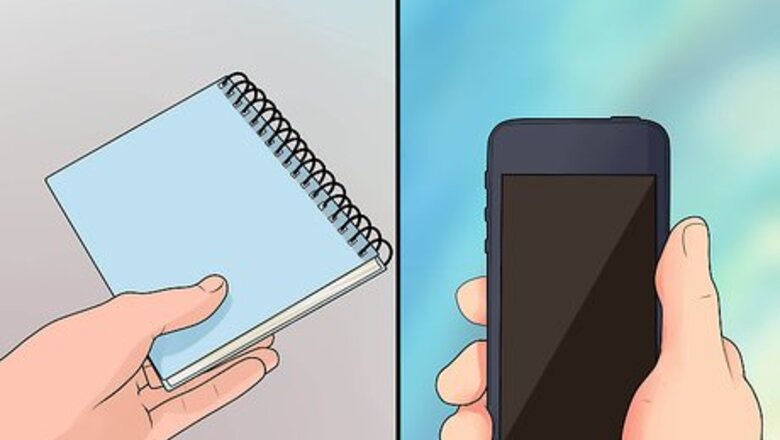
views
Brainstorming Creative Writing Ideas
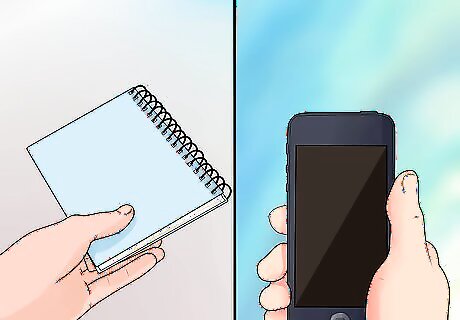
Keep a small notebook to constantly record ideas, lines, and characters. Inspiration comes in many places, but one of the places it never seems to come is when you sit down and tell yourself to "come up with an idea." Take the pressure off of your writing days by recording ideas all day, every day. From lines you overhear that make you laugh to sudden stories that burst into your mind, keep track of ideas throughout the day, not just when you sit at the computer. You can also use your phone to keep track of your ideas! You could type them in your notes, email them to yourself, or use an app, such as Google Docs.

Try mixing and matching two ideas you've never seen before. There are no completely original ideas in writing -- everything builds off of other work, real life events, and new combinations of other art forms to form something "new" from the old. But this is incredibly freeing, allowing you to experiment and play with crazy new ideas and combinations to make something no one has quite seen before. House was a brilliant, but simple combination of medical dramas with one-off "murder mystery" type shows, swapping medical diagnosis for detective work. Star Wars is a typical hero's quest, with the plot ripped straight from the oldest known Greek stories. George Lucas's genius? Simply setting it in space. The collected works of William Shakespeare are full of "artistic theft," as almost every one of his plays was a brilliant amalgamation of other plays, books, and historical records.
Make reading fiction a regular habit. Reading often can help you better understand how established writers structure their work, write good sentences, and plot out a story. You can also recognize how they use literary devices to enhance their work. This helps you become a better writer. Try to read every day, even if it's just a few pages. Reading books in the genre you write is an excellent idea, but it's also helpful to read books in other genres. This can help you broaden your understanding of the writing craft and gain new ideas for your own work.
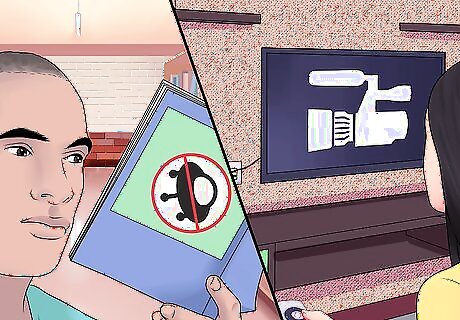
Get inspiration from non-fiction sources. Read and watch non-fiction books and documentaries to gain real-world inspiration. Pay attention to the news, read a biography that catches your eye, and watch documentaries and series. What sorts of issues, stories, and ideas grab you? Are there perspectives that would be fun to write from, or that you've never heard from creatively? The world around you is filled with inspiration, so use it. Try writing from the perspective of the people you see on the news. You understand the facts of a war or struggle, but try to actually imagine living it. Creative writing doesn't have to be fiction. Use stories from your life that speak out to you as potentially exciting or compelling stories.

Consider brainstorming with a close friend or group. You can toss around ideas and build on them. This isn't for every writer, but everyone should at least try group writing or brainstorming. It usually works best when someone brings an initial idea in: "what if the Terracotta warriors were really alive," allowing everyone to pitch in ideas and build on the initial idea until it's built into a story worth telling. Almost all writers enjoy having at least one person to bounce ideas off. Frequently, just vocalizing your plots or ideas can make them much clearer and easier to write.

Sit down at the computer and type something, anything, to get started. Just start typing, and don't let yourself stop for at least five minutes. Write everything that comes to mind, following ideas and threads until you get distracted or bored, then write about something else. This doesn't have to turn into anything -- rather, free writing is the equivalent of stretching for athletes. You get out of your head and onto the page-- the first step towards getting your writing groove going. Look online at collections of "free writing prompts." There are thousands of ideas out there to spark your creative juices and get the writing flowing, even if only for a few minutes. Rewrite passages from your favorite books -- many famous authors, from Billy Collins to Cormac McCarthy, literally re-wrote favorite chapters to learn from the best.
Writing Effectively and Creatively
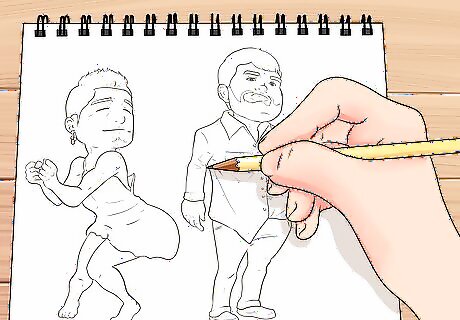
Write the story out linearly to give yourself a template. You can write out a concise summary or a detailed explanation, depending on your preference. If you're writing poetry, you might start simply sketching ideas, images, and lines that pop in your head, worrying about organization later. If you're writing a novel, you could write a 1-2 page super summary, working through the cause-and-effect now so that you can write in the details later. There is no "right" way to start writing. Some people plan, storyboard, and plot, and others plow right into it and deal with the rest in revision. Experiment for what works for you.

Know that great characters drive great stories, not the other way around. The most common moment that people tune out of a story is when the character starts doing things that no rational person would do. This is usually because the writer is trying to force the characters to hit a plot point, instead of letting the character's decisions drive the next plot point. The best characters are: Well-rounded. Good characters are multi-dimensional, with both strengths and weaknesses. They are not just the "strong hero," "damsel in distress," or a million other simplified character types. They are people and have nuance and complexity Desiring something, and fearing something else: Plots are driven by character's wants -- what do they need or desire to be happy or safe? Some characters are driven by fear, or the desire not to be something. But all characters are pushed by some desire, a desire that drives their plot. This is your character's motivation. Aware self-agents Good characters make decisions, for better or for worse, that they think will help them. Always ask yourself -- if I were in the same situation as the character, would I see that as a good decision? Sometimes, only one decision catapults the whole story, as the character deals with the fallout. Other times characters make decisions every minute. Just make sure they fit the character.
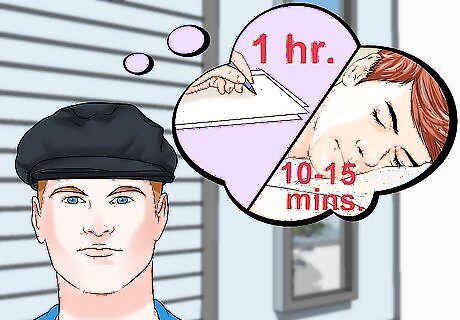
Set goals and timers to keep yourself writing. Despite the free-flowing, creative aspects of writing, all the best authors and poets know that discipline is required to truly get your vision out. You'll never finish your story or idea if you're constantly turning to Facebook, or researching an obscure point or allusion, or quitting at the first scent of writer's block. The best way to become a creative writer is to be disciplined, which can be accomplished in a variety of ways: Setting writing timers -- 1 hour of straight writing, 10-15 minutes of relaxing, then repeat. Deciding on a daily writing time and place, building the habit. Getting a writing buddy -- someone you trade 10 pages with each week at the same time.

Think in terms of "scene" when writing, not the entire project. This is a great way to make your writing more tight, concise, and manageable, especially for big projects. No matter what you're working on, from poetry to epic novels, limit your attention while writing to the current scene you're in. How can you make this moment powerful on its own? If each chapter or stanza is compelling, they will start to flow together when placed side-by-side. Consider each scene, chapter, or segment a short story. How can you make it compelling if it was published all on its own? Make sure you establish the setting, appealing to the reader's 5 senses. Additionally, set the mood of your scene. The reader should be able to clearly visualize your setting when they read your writing. Scenes should have tension and rising action -- starting with a problem, making things more difficult or introducing new challenges, and resolving everything in some way at the end. It seems overly simplistic, but these three stages are the basis of 95% of all good plots.

Fight writer's block by just continuing to write. It is that easy, and if you don't know what to write about, write anyway. It can help to ditch the computer and grab a pencil. Take the pressure off yourself to write something amazing and just write. Remember, even the very best writers always revise, and what you write down while "blocked" will get better over time. But if you sit there silently, or go do other things when you should be writing, you'll never get over your block. This isn't to say some relaxing time isn't worth it when you're stuck, just get back to writing after you're done walking, reading, meditating, or enjoying a cup of writer's block coffee. Never tell yourself that, "I can't write right now." All you have to do is sit down -- the words will flow if you give them the time and energy to do so.
Editing Your Work for Publication
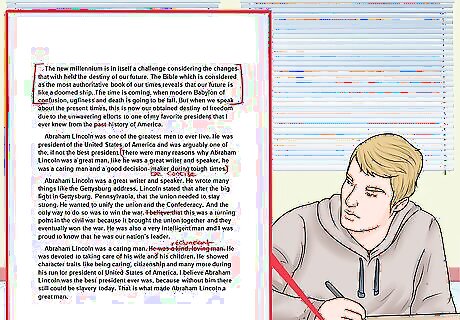
Understand that your first draft is just that -- a draft. Many young writers completely freeze up when they start writing because they immediately realize that it isn't as good on the page as it is in their head. But every writer in the world, from Margaret Atwood to Aristotle, knows that they need to put something on the page, anything, in order to polish it up and make it better. So take a deep breath and remind yourself that this is nothing new, and your "terrible" first draft won't be terrible for long. Looking for inspiration that you're not alone? Check out Raymond Chandler's writing process: “Throw up into your typewriter every morning. Clean up every noon.”

Read your entire work and ask what the most important threads are. As you re-read, highlight the passages that stand out to you. What characters can you not get enough of, or want to keep writing about? What plot continually crops up in your head with new ideas or twists? What locations feel the most lived in. Go into the first revision for an eye for what works, not for what you don't like, and you'll get a blueprint for further revision. Know that you'll likely need to keep writing, filling in holes you didn't notice on your first draft. Prioritize those areas that grip you the most already, or the characters that seem the most alluring to write. It is not uncommon for the tone or main idea of a story to pivot at this point -- don't be afraid to forge a bold new direction if it is clearly more enjoyable than the original plot or perspective.

Cut as much away from the first draft as you can, ruthlessly erasing. It hurts to cut, but this is the only way to make your story tight, coherent, and powerful. Everything that isn't essential to your story or idea needs to go, mercilessly hacking and slashing until you're left only with the absolute best. If it isn't necessary to the story, it has to go. The most powerful stories, poems, and works make every single word count, gaining power by cutting straight to the point and avoiding filler. Make sure your dialogue actually adds something and doesn't simply regurgitate information for the audience. Reading dialogue out loud, with a friend, is the best way to make sure it is natural sounding and worth keeping. Save new copies of your work every day you open it up, allowing you to still keep copies of everything you erase in case you later change your mind. Hemingway said it best in a letter to his friend F. Scott Fitzgerald: “I write one page of masterpiece to ninety-one pages of s--t. I try to put the s--t in the wastebasket.”

Show your work to others and ask for feedback. Writing is a form of communication, and what is communication if it is only with yourself?! Sharing your story is intimidating, but it is the only way to become a better creative writing. Other people haven't lived in your story for as long as you have, and that's a good thing -- they'll have a fresh set of eyes to see holes, issues, and the hidden gems you might not have noticed. Pick your people wisely-- friends who love to read, and you know will be honest with you, are often the best picks. Let your friends know that you're looking for constructive criticism. While being nice is great, it won't help you write any better.

Edit thoroughly multiple times checking that grammar and spelling are perfect. Don't give a potential editor or publisher an excuse to throw your work in the trash after the first typo (which, with standards and competition as high as they are today, they will). Run through the whole thing 2-3 times to fix the little things like word choice and spelling, and consider using a program like Grammarly or hiring a freelance copy-editor for bigger projects.

















Comments
0 comment